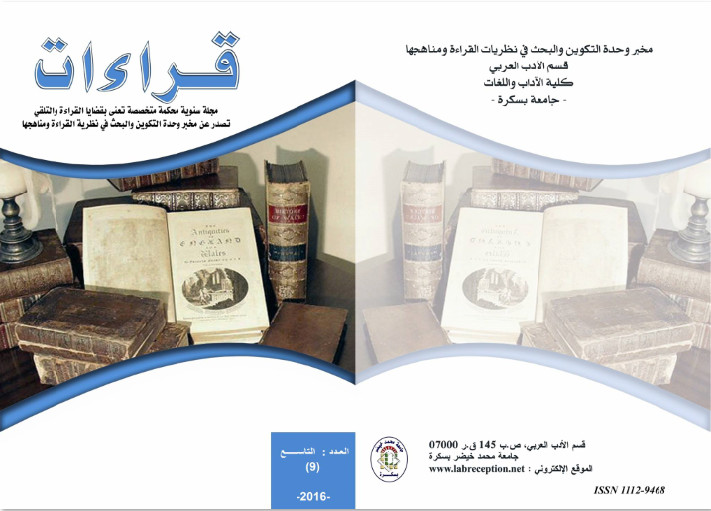سرّ التوحيد بين التأويل والتفسير في المذهب الاعتزالي -القاضي عبد الجبّار أنموذجا-
Résumé
إنّ ظهور فلسفة التأويل ساعد علماء المسلمين على الغوص في غمار النصّ القرآني لمحاولة تأويل معانيه وفق قراءات مختلفة.
وما دمنا نبحث في إشكاليّة التوحيد بين التأويل والتفسير في الفكر الاعتزالي لدى القاضي عبد الجبّار، نشير إلى أنّ القرون الأولى للحضارة العربيّة الإسلاميّة كانت مهادا نمت فيه النّزعة التأويليّة، فمثّل علم الكلام مجالا خصبا للمجادلة في النصّ الدّيني ومقتضيات فهمه.
ولعلّ جهد القاضي عبد الجبّار يكمن في كونه أسقط من خلال عمله التأويلي وتعويله على العقل المقالات القائلة بتشبيه الذات الإلهيّة، وفنّد عقيدة التثليث. لذلك كان القاضي برهانيا في إثبات أصل التوحيد الّذي قامت عليه عقيدة المعتزلة، محاولة منه لإثبات سلامة منهجه التأويلي المتّبع في كتاباته.
Resumé:
Montheism between interpretation and explanation in Elmoutazila school of thought: Alkadhi abdeljabar as a case study
The emergence of hermenentics helped Muslim scholars delve into the Koran text in an attempt to interpret the meanings of the Book in the light of different readings. Being concerned with the issue of the interpretation of monotheism in Elmutazila thought, Alkadhi Abdeljabar noticed that the early centuries of the Arab –Muslim civilization paved the way for the development of the interpretative hermenentics tendency which is a field called Alkalam- or “speculative theology.” It represents a fertile domain of argumentation on the religious text and requirements for its inderstanding.
Alkadhi abdeljabar’s contribution consists in refuting the proposition of the personification of the divine-self which served to fend the dogma of trinity while relying on interpretation and rationality.
As such, he had been able to reasonably identify the origin of monotheism as the cornerstone of Elmutazila’s doctrine to confirm the integrity of his interpretation- oriented writings.


